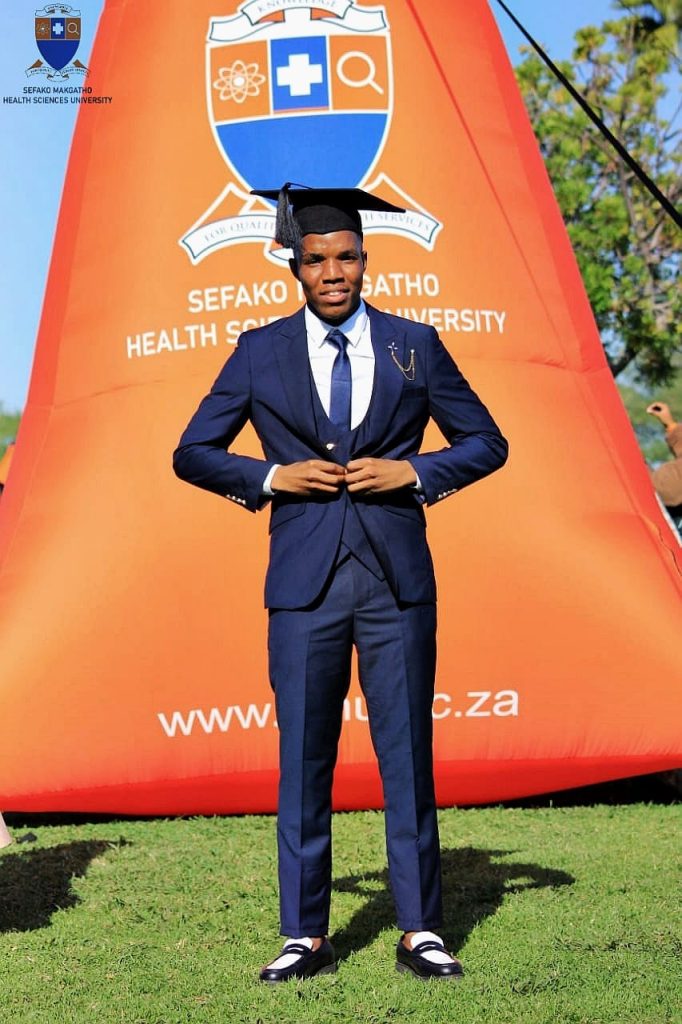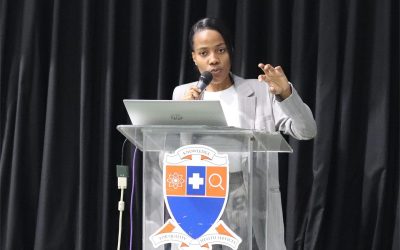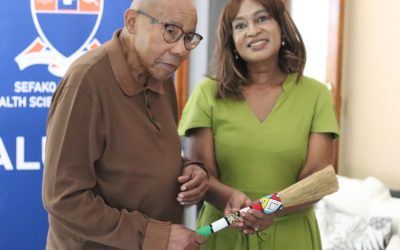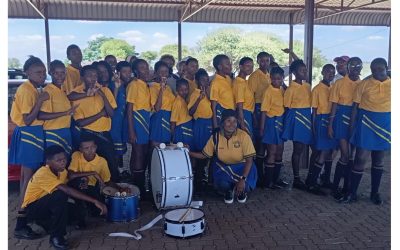At just 22 years old, Hermy Mantjiu is proving that hard work, curiosity, and resilience are a powerful combination. Hailing from Kalkspruit Ga-Maraba in Limpopo, Hermy recently graduated summa cum laude with a Bachelor of Science Honours in Statistics from Sefako Makgatho Health Sciences University (SMU). His remarkable academic journey reflects not only his brilliance but also his commitment to using mathematics to solve real-world problems.
 Now an honours student working for the Department of Statistical Science, Mantjiu reflects proudly on his academic success. “It hasn’t always been easy,” he says, “but I’ve worked hard, stayed disciplined, and grown not just academically, but also personally. My achievements reflect my dedication and love for learning, especially in challenging subjects like mathematics and statistics.”
Now an honours student working for the Department of Statistical Science, Mantjiu reflects proudly on his academic success. “It hasn’t always been easy,” he says, “but I’ve worked hard, stayed disciplined, and grown not just academically, but also personally. My achievements reflect my dedication and love for learning, especially in challenging subjects like mathematics and statistics.”
Inspired by Mason Cooley’s quote, “Procrastination makes easy things hard, hard things harder,” Mantjiu’s disciplined approach has guided him through the rigours of Mathematical Science — a field he describes as intellectually stimulating and deeply rewarding.
“I love how maths challenges me to think differently. It’s like solving a puzzle — sometimes frustrating, but incredibly satisfying when everything finally clicks,” he explains. Unlike traditional mathematics, which focuses largely on theory, Mathematical Science merges pure and applied maths with statistics, computing, and modelling. “That’s what makes it so versatile and relevant in today’s data-driven world,” he adds.
His programme covered a wide range of areas, including abstract algebra, applied mathematics, and statistics. While he admits that abstract algebra was particularly challenging, he grew to appreciate its elegance and structure. On the other hand, mathematics and statistics stood out as favourites, especially when applied to real-world scenarios.
Mantjiu’s Honours project, “Correlates of Reading Literacy Among Participants Aged 15–30: A Case Study of Four Provinces in South Africa”, demonstrated how statistics can directly inform decision-making in areas such as health, finance, and technology. “It showed me how statistics can directly support decision-making in health, finance, and technology,” he says.
His work wasn’t confined to theoretical exercises. Mantjiu became proficient in RStudio, Stata, and MATLAB, using them to simulate complex systems, solve differential equations, and analyse datasets. “These computational tools made our work more efficient and accurate,” he says. “We even solved differential equations using numerical methods like Euler and Runge-Kutta.”
Mantjiu’s passion for problem-solving extends into interdisciplinary fields such as data science and public health. He believes mathematical modelling plays a crucial role in addressing global issues like climate change, pandemics, and inequality. “Statistical inference, for example, helps us make informed decisions based on uncertain information — from clinical trials to financial forecasting,” he explains.
His success was not a solo journey. “My mentors and the students I tutored had a huge impact on my growth,” he shares. “Teaching others deepened my own understanding and kept me motivated.” Collaborative projects also helped him build communication and teamwork skills — attributes he believes are essential in both academia and industry.
Now pursuing an Honours degree in Statistics, Mantjiu has set his sights on a data-driven career in research, analytics, or education. “Eventually, I’d love to pursue a Master’s in biostatistics or data science. I want to work where research meets impact — especially in health or finance.”
When asked what advice he has for future students, his answer is clear: “Be ready to think hard, fail forward, and stay curious. Mathematical Science isn’t just about numbers; it’s about thinking clearly, solving problems, and making a difference.”
Mantjiu’s journey is a shining example of what South African youth can achieve with the right mindset, support, and sense of purpose. As he looks to the future, he carries with him not just academic accolades but a vision for how mathematical science can unlock real change in the world.
By Tumelo Moila



